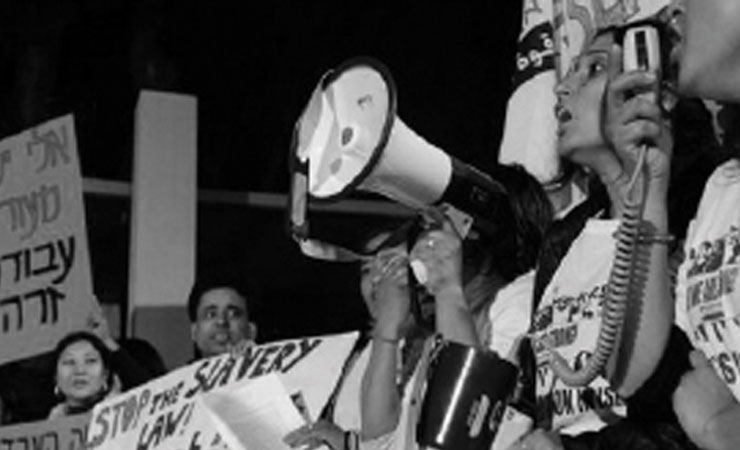By Abigail F. Kolker
In the last 50 years, women’s international migration has expanded in scope and changed in character, being dubbed the “feminization of migration.” Whereas in the past women mostly migrated as family dependents, today they increasingly migrate by themselves in search of economic opportunities, usually found in the care sector.
The factors that push and pull migration are different for men and women, resulting in differential paths and treatment. State policies and practices are largely responsible for these differences. Female migrants’ destination, and most importantly, their quality of life, is largely determined by receiving states’ policies. In honor of International Women’s Day, celebrated today, let us reflect upon the feminization of migrant workers in Israel, examining how the Israeli State is largely responsible for these women’s presence and quality of life here.
In Israel, the feminization of migration is mostly occurring due to the rapid growth of the caregiving sector, the majority of whom are women (80%) from South and Southeast Asia and Eastern Europe. The ever-growing demand for private caregivers for the elderly and disabled – and specifically for migrant caregivers- is not purely organic but rather largely a result of government policies.
The deficit of care workers in Israel is related to the aging population, the increase of women in the workforce, and the privatization of welfare services. With more elderly needing round-the-clock care and fewer family members available to provide care, the Israeli State needed to step in. Policymakers created the Nursing Benefit, which subsidizes the employment of in-home care workers for eligible elderly, and the Special Care Services Benefit for disabled Israelis.
While the program succeeded in enabling tens of thousands of dependent Israelis to remain within their homes and communities, unfortunately it was severely underfunded. The State’s solution, projected to reduce the cost of care by 50% or more, was to recruit live-in workers from abroad. Immigration policies not only initiated the employment of migrant workers in the caregiving field, they also allow for its unabated growth, as there is no quota on the number of visas available for migrant caregivers. As a result, today caregiving is the largest sector for the employment of migrant workers in Israel, and it will likely continue to expand. These very policies result in the feminization of migration, as women are consistently recruited at higher rates than men for caregiving, reflecting the notion of care work as women’s work.
The Israeli government not only channels migrant women into caregiving jobs, but it also has the unparalleled ability to confer or deny them rights, directly influencing their susceptibility to abuse and exploitation. While vulnerability is a universal human condition, some groups of people are inherently more insecure due to their social position. Female migrant workers are innately vulnerable due to their gender, class, race, and legal status.
Caregiving is a physically and emotionally difficult job. Isolated within the private home, it has notoriously high rates of exploitation and abuse. Unfortunately, rather than providing these women extra legal protection, the Israeli State exacerbates their vulnerability through its immigration and employment policies. Migrant caregivers are legally required to live in the employers’ home and work 24 hours a day, 6 days a week. This blurs the boundary between work and rest, enhancing the risk of exploitation and expansion of duties beyond caregiving (to include cooking, cleaning, taking care of other family members, etc.), with limited or no supervision from outside sources. State regulations also reduce migrant caregivers’ freedom to change employers and geographical location, further limiting their ability to extract themselves from unsafe or unfair employment situations.
The Israeli State sanctions their economic exploitation by excluding migrant caregivers from the right to overtime pay. The State also permits their mistreatment by ignoring corrupt recruitment practices, most notably the illegal collection of exorbitant brokerage fees by Israeli manpower agencies. The consequences are more than just economic; these fees inevitably create debt bondage and heighten the risk of Trafficking in Persons.
In a similar vein, the State limits caregivers’ access to legal recourse through direct action as well as gross negligence. Migrant caregivers are uniquely excluded from the protection of the Ombudsman, who handles migrant workers’ complaints about employment violations. In addition, studies have shown that the enforcement of labor laws in the caregiving sector by State officials is inexcusably deficient, further reflecting the State’s lack of commitment to the protection of these workers.
In sum, the government’s welfare, immigration, and employment policies create and inflate the demand for migrant caregivers, authorize their arrival, facilitate their growing numbers, and influence their working conditions and quality of life. These policies and practices, which specifically target the female-dominated caregiving sector, are discriminatory not only against migrants but also against women.
In a well-attended 2014 Rally for Equal Rights for Caregivers, hundreds of caregivers, almost all women, marched the streets of Tel Aviv and implored the Israeli Government to sign the International Labor Organization’s Domestic Workers Convention (C-189), which is uniquely designed to promote the human rights of all workers in the care industry. Its ratification by the Israeli government would demonstrate the State’s commitment to providing much-needed protection to this vulnerable group of workers. Their action reflects the theme of this year’s International Women’s Day: “Make it Happen: Celebrate Women’s Achievements, Call for Greater Equality.” Let us celebrate migrant caregivers’ contributions to Israeli society and call the Israeli government to provide greater legal equality, treating them as workers deserving of humane working conditions, freedom of movement, fair payment, safe recruitment practices, and basic labor protections.
Abigail F. Kolker is a PhD candidate in Sociology at the City University of New York Graduate Center. She is currently a Shatil Fellow at Kav LaOved.


